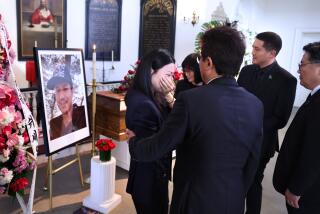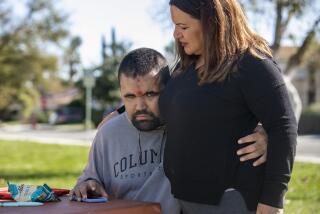Looking at a Murder for What It Really Is
- Share via
At first I thought: If there’s such a thing as a poignant murder, maybe this is it. As oxymoronic as the term sounds, this killing sounded different than the run-of-the-mill crime when somebody shoots somebody else.
This one involved a father, apparently distraught over job uncertainty, who went to pick up his 27-year-old severely autistic son at the vocational school he attended in Mission Viejo. Instead of bringing him home as he had done so many times before, the father shot and killed his son as they sat in the family van in the school parking lot. The father then shot and killed himself.
The armchair psychologist in me leaped into mental action. What kind of pressures, however unintended, must the son have brought to bear on his parents? Caring for severely disabled children, especially for so many years, must take a tremendous toll. And although 55-year-old Delfin Bartolome had reportedly become more despondent over his job security, it was only Dale--the eldest of his three sons--whom he took with him to eternity. In Delfin Bartolome’s suicidal depression, did he somehow think he was sparing someone from something by killing Dale, as well?
I’m now leaving those questions behind, feeling I was asking the wrong questions while walking down the wrong path.
There’s nothing very poignant about killing another human being, a point driven home Thursday by Kathryn Hebel, the executive director of Vocational Visions, the school that Dale Bartolome attended.
Three days after the murder-suicide, the traumatic aftermath of the incident reverberates throughout the school, Hebel says. On any given day, the school has about 120 developmentally disabled people on site and another 100 at area work sites. Some, but not all, of them will realize Dale is dead and will grieve in their own way. Some staffers have not returned to work because of their grief. One thing that Hebel refuses to do is rationalize the taking of Dale’s life. On that count, she deserves to be heard.
In a soft, level voice, she decries what she feels might be a perception that disabled people are burdens on society or those close to them.
Hebel and her staff don’t see burdens. “What we see are inspiring individuals who go through life challenged but with determination,” she says. They see people who, at heart, want to give and not take and who have collected pennies for a Kiwanis Club charity or hold jobs at a variety of businesses in Orange County. And people who, perhaps in ways that some of us don’t understand, exult and despair over life’s vicissitudes.
In short, Hebel says, they are people who bring their own value to American life and to their families. It isn’t true, she says, that families typically feel burdened by raising a child with severe disabilities. There certainly is stress--it would be dishonest to sugarcoat it--but those same disabled people often bring great joy to their parents or loved ones.
“We see the human value of each individual or personality,” Hebel says, “and to take that life for any reason is unfathomable to us.”
She has extended her sympathies to the Bartolome family and takes pains not to condemn Delfin Bartolome. Her concern, she says, is only that Dale Bartolome’s death be seen for what it was--a murder--and not as something more benign.
Delfin Bartolome’s motive died with him. His 27-year-old nephew, Roger Mationg, said on Thursday: “It’s as much a mystery today as the day it happened. We’re talking about it, yeah, but we don’t have any real insights as to why it happened.”
Mationg says he never had the impression that Delfin saw his son as an immense burden nor that he felt unduly weighed down in caring for him with his wife. “I can’t give you any more conjectures,” he said, politely and softly.
Nor should he be asked for any. Nor should we guess at why Delfin Bartolome did what he did. Nor try to soften it.
He took a life of someone of value, of someone who will be missed by those who knew him.
“We’re trying to find a silver lining,” Hebel says. “We don’t think there was one. We’re dealing with the death of Dale now.”
*
Dana Parsons’ column appears Wednesdays, Fridays and Sundays. Readers may reach Parsons at (714) 966-7821, at The Times’ Orange County edition, 1375 Sunflower Ave., Costa Mesa, CA 92626, or at dana.parsons@latimes.com.
More to Read
Sign up for Essential California
The most important California stories and recommendations in your inbox every morning.
You may occasionally receive promotional content from the Los Angeles Times.













